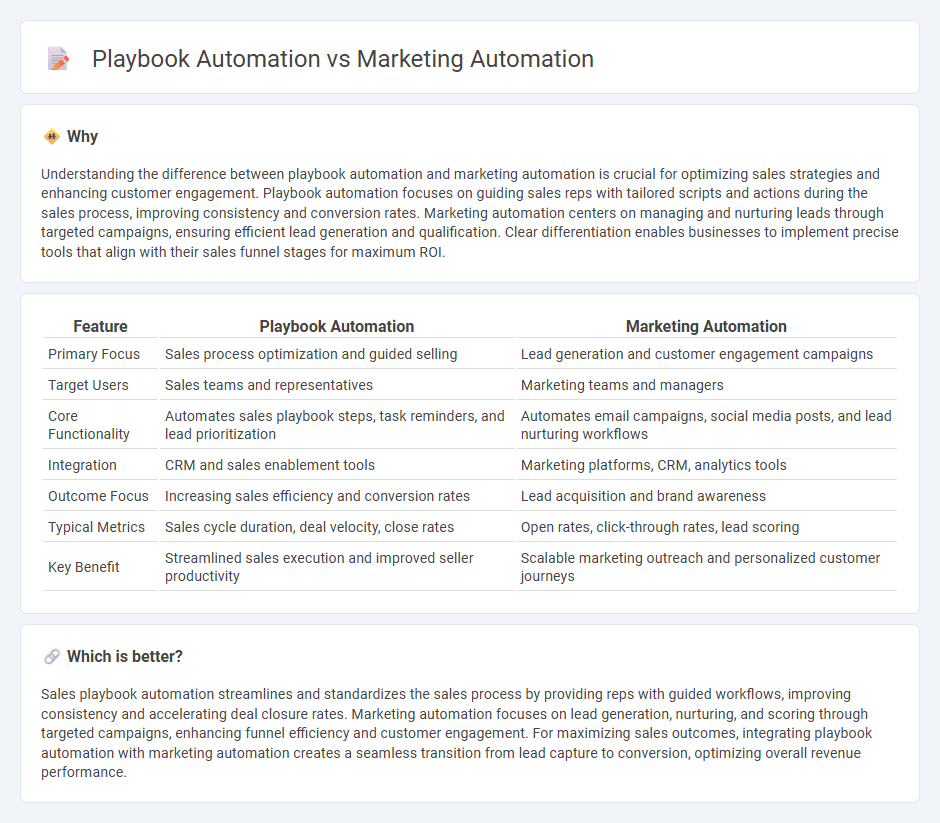
Sales playbook automation streamlines the step-by-step sales process by providing sales teams with structured workflows, personalized messaging, and real-time performance analytics, enhancing efficiency and consistency. Marketing automation focuses on automating lead generation, email campaigns, and customer segmentation to nurture prospects through the buyer's journey, increasing engagement and conversion rates. Explore how integrating sales playbook automation with marketing automation can optimize your entire revenue cycle for better results.
Why it is important
Understanding the difference between playbook automation and marketing automation is crucial for optimizing sales strategies and enhancing customer engagement. Playbook automation focuses on guiding sales reps with tailored scripts and actions during the sales process, improving consistency and conversion rates. Marketing automation centers on managing and nurturing leads through targeted campaigns, ensuring efficient lead generation and qualification. Clear differentiation enables businesses to implement precise tools that align with their sales funnel stages for maximum ROI.
Comparison Table
| Feature | Playbook Automation | Marketing Automation |
|---|---|---|
| Primary Focus | Sales process optimization and guided selling | Lead generation and customer engagement campaigns |
| Target Users | Sales teams and representatives | Marketing teams and managers |
| Core Functionality | Automates sales playbook steps, task reminders, and lead prioritization | Automates email campaigns, social media posts, and lead nurturing workflows |
| Integration | CRM and sales enablement tools | Marketing platforms, CRM, analytics tools |
| Outcome Focus | Increasing sales efficiency and conversion rates | Lead acquisition and brand awareness |
| Typical Metrics | Sales cycle duration, deal velocity, close rates | Open rates, click-through rates, lead scoring |
| Key Benefit | Streamlined sales execution and improved seller productivity | Scalable marketing outreach and personalized customer journeys |
Which is better?
Sales playbook automation streamlines and standardizes the sales process by providing reps with guided workflows, improving consistency and accelerating deal closure rates. Marketing automation focuses on lead generation, nurturing, and scoring through targeted campaigns, enhancing funnel efficiency and customer engagement. For maximizing sales outcomes, integrating playbook automation with marketing automation creates a seamless transition from lead capture to conversion, optimizing overall revenue performance.
Connection
Playbook automation and marketing automation are interconnected through their shared goal of streamlining the sales funnel and improving lead conversion rates. Playbook automation provides sales teams with data-driven strategies and standardized processes, while marketing automation delivers personalized content and nurtures leads at scale. Together, they enable cohesive customer journey management by aligning marketing outreach with sales execution, resulting in higher efficiency and increased revenue growth.
Key Terms
Lead Nurturing
Marketing automation enhances lead nurturing by delivering personalized content and timely follow-ups based on user behavior across multiple channels. Playbook automation structures the lead nurturing process into predefined steps, ensuring consistent engagement and enabling sales teams to respond effectively at each stage. Explore how integrating both approaches can maximize lead conversion and streamline your sales pipeline.
Workflow Sequences
Marketing automation utilizes workflow sequences to streamline repetitive tasks like email campaigns and lead nurturing, enhancing customer engagement through personalized touchpoints. Playbook automation focuses on structured, step-by-step sales processes embedded in workflow sequences to ensure consistent execution of best practices and improve conversion rates. Explore further to discover how integrating these automation strategies optimizes both marketing and sales performance.
Trigger-based Actions
Trigger-based actions in marketing automation activate workflows when specific customer behaviors occur, such as opening an email or clicking a link. Playbook automation expands this concept by utilizing complex decision trees and predefined sequences to guide sales and marketing teams through personalized, multi-step interactions. Explore how integrating trigger-based actions with playbook automation can enhance your customer engagement strategy.
Source and External Links
What is marketing automation? - IBM - Marketing automation is the use of software and technology to streamline routine marketing processes across multiple channels, leveraging AI and machine learning to enhance lead generation, customer experience, and ROI.
What is Marketing Automation? | Salesforce US - Marketing automation uses software to automate marketing tasks based on customer actions, enabling personalized communication at scale and saving time by reducing repetitive manual work.
Learn about marketing automation and how it works - Adobe Blog - Marketing automation helps businesses optimize customer interactions by automating email campaigns, social media posts, and lead nurturing, integrating with CRM systems to improve conversion and marketing ROI.
 dowidth.com
dowidth.com